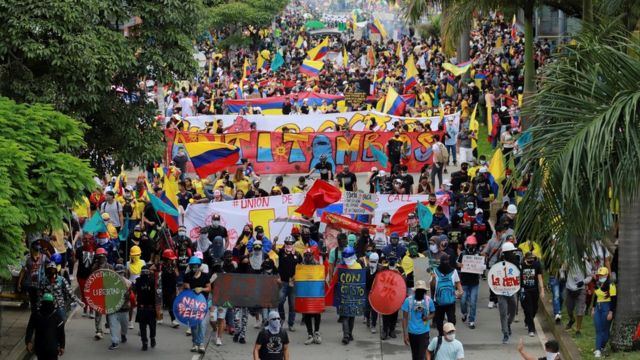Colombia protests: Duque sends military to Cali
Colombian President Iván Duque says he is sending the military to restore order in the city of Cali after weeks of deadly anti-government protests.
Four people died in Cali on Friday night, the latest casualties in a month of protests which have claimed dozens of lives.
The protests began in April over a proposed tax increase.
The tax plan was withdrawn but the protests grew to cover police violence, poverty and Colombia’s health crisis.
Two weeks of negotiations between the government and protesters have stalled.
Cali, which has become the epicentre of the protest movement, is under curfew until Saturday morning.
Speaking at a news conference in Cali, Mr Duque said he was sending in the “maximum deployment of military assistance” to the police.
“This deployment will almost triple our capacity in less than 24 hours throughout the state, ensuring assistance as well at critical points, where we have seen acts of vandalism, violence and low-intensity urban terrorism,” he said.
The attorney-general said one of those killed on Friday was his agent. Reports from Cali say the man opened fire on protesters, who then attacked him.
How did the protests begin?
The demonstrations started on 28 April and were initially in opposition to a proposed tax reform which would have lowered the threshold at which salaries are taxed.
The government argued that the reform was key to mitigating economic difficulties but many middle-class Colombians feared they could slip into poverty as a result.
After four days of protests across the country, President Duque said he would withdraw the draft legislation.
However, human rights groups accused police of using tear gas and, in some cases, live ammunition to disperse the protests.
Dozens of people have since died.
On Friday, Colombians marked one month since the protests began with marches across the country.








